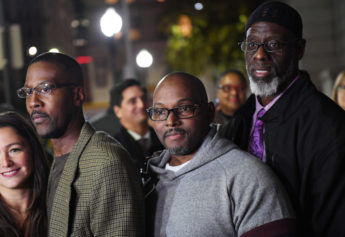Rubin “Hurricane” Carter, the boxer who became an international symbol of the racism in America’s criminal justice system and the prevalence of wrongful convictions, is dead at 76.
Portrayed movingly by Denzel Washington in a 1999 film that earned the actor an Oscar nomination and memorialized in a song by Bob Dylan, Carter served nearly 20 years in prison after he and a friend were wrongfully convicted of three murders that took place in 1966 in a New Jersey bar.
Carter died of prostate cancer at his home in Toronto, Canada, where he moved after his release in November 1985, vowing never to set foot again in New Jersey.
Carter died in his sleep with his longtime friend, John Artis, at his side. Artis had been convicted with Carter of the murders back in 1967.
“He didn’t ask me (to come here),” Artis told the New York Daily News. “When I heard he was dying, it was a no-brainer. I didn’t give it a second thought. All he knew was I knocked on the door and said, ‘All right. I’m here.’ That pleased him. It brought a chuckle from him.”
Carter’s case became a cause celebre among celebrities, even before it was made into a Hollywood film. After his release, he remained an active advocate in the movement to free wrongfully convicted prisoners.
“There are far more people who are wrongly convicted than people would like to think about,” Carter has said of his activism. “And this is my work because people came to help me when I was in dire need of help.”
Of the 314 post-conviction DNA exonerations in United States history, about 70 percent of those exonerated were people of color, according to The Innocence Project.
When he was convicted, Carter was a rising if undersized middleweight contender with a record of 27-12-1 with 19 knockouts, including a knockout of two-division champ Emile Griffith in the first round in 1963. Carter fought for a middleweight title in December 1964, losing a unanimous decision to Joey Giardello.
But his life abruptly changed in June 1966, when three white people were shot by two Black men at the Lafayette Bar and Grill in Paterson and an all-white jury believed the testimony of two thieves — who later recanted their stories — in convicting Carter and Artis.
Artis, who was a “model” prisoner, was granted parole after 15 years, but that wasn’t the case for Carter. He would not give an inch to the prison guards, refusing to wear prison clothes, eat prison food or take a prison job. He spent many days in solitary confinement, which gave him the time to read law books to help with his appeal and write a biography, called “The Sixteenth Round,” that many saw as brilliant.
Carter even made the guards call him “Mr. Carter,” which they did. His case grew into a movement that attracted celebrities like Muhammad Ali, Burt Reynolds, Roberta Flack, Stevie Wonder, Ed Koch, Jesse Jackson, Norman Mailer, Jimmy Breslin, Bill Bradley, Candice Bergen and Dylan.
A benefit concert was held at Madison Square Garden, and there were protest marches. When the witnesses recanted the testimony, Carter was granted a new trial and briefly freed in 1976. But after the police pressured the witnesses to change their minds again, Carter was convicted at a second trial and sent back for nine more years.
“I wouldn’t give up,” Carter said in an interview on PBS in 2011. “No matter that they sentenced me to three life terms in prison. I wouldn’t give up. Just because a jury of 12 misinformed people … found me guilty did not make me guilty. And because I was not guilty, I refused to act like a guilty person.”


